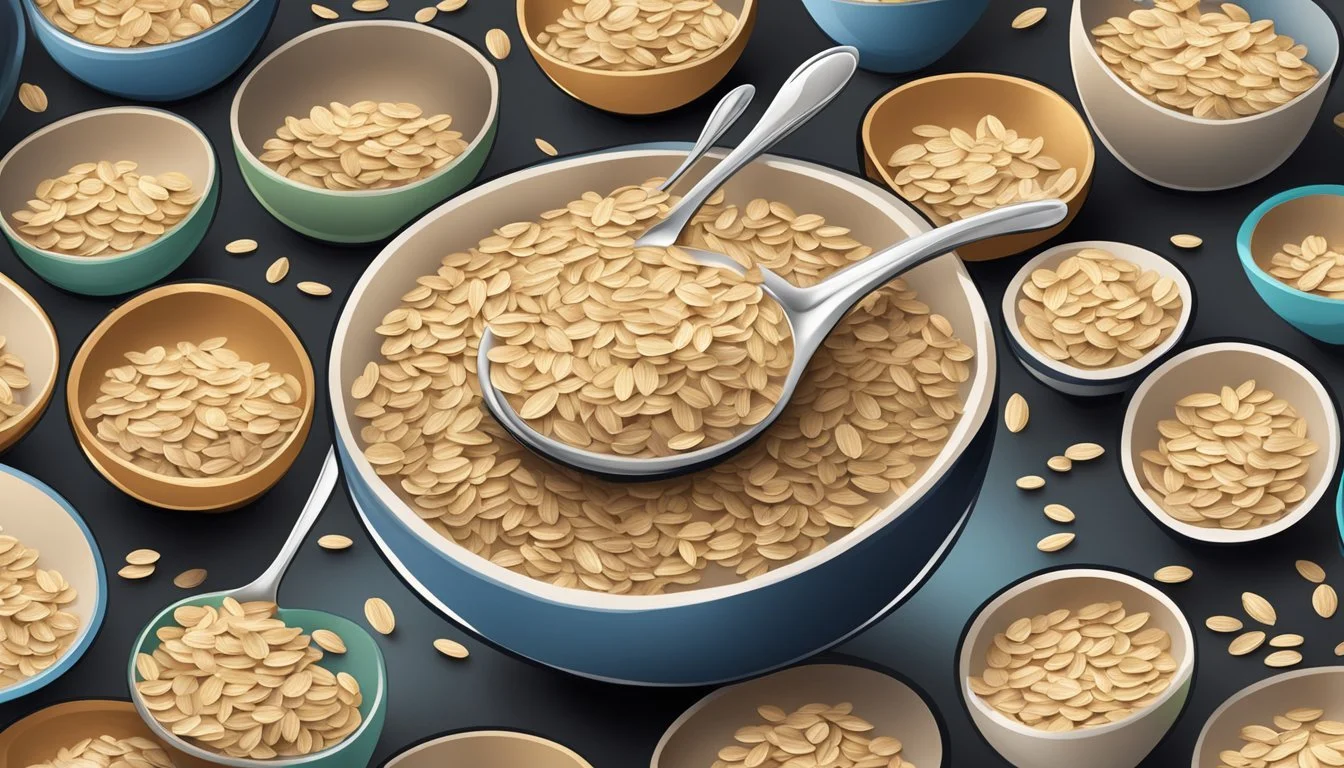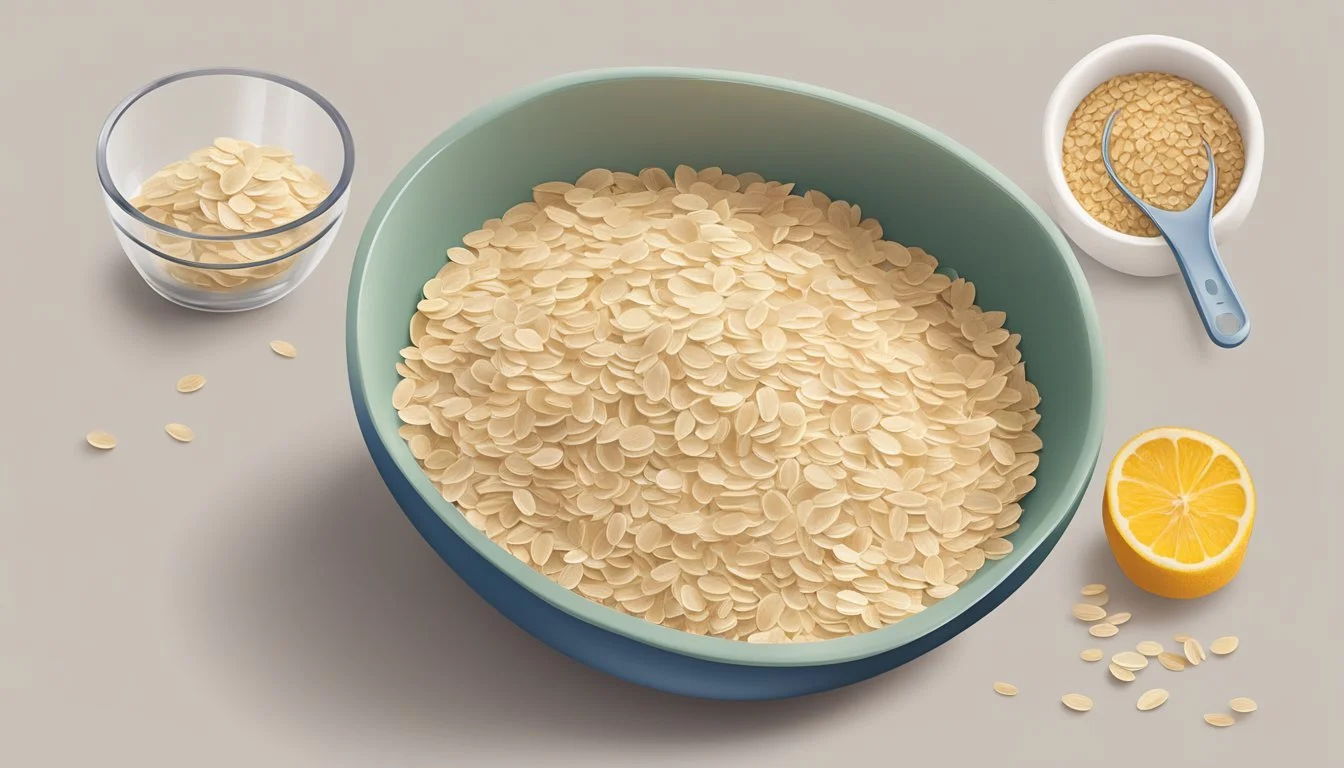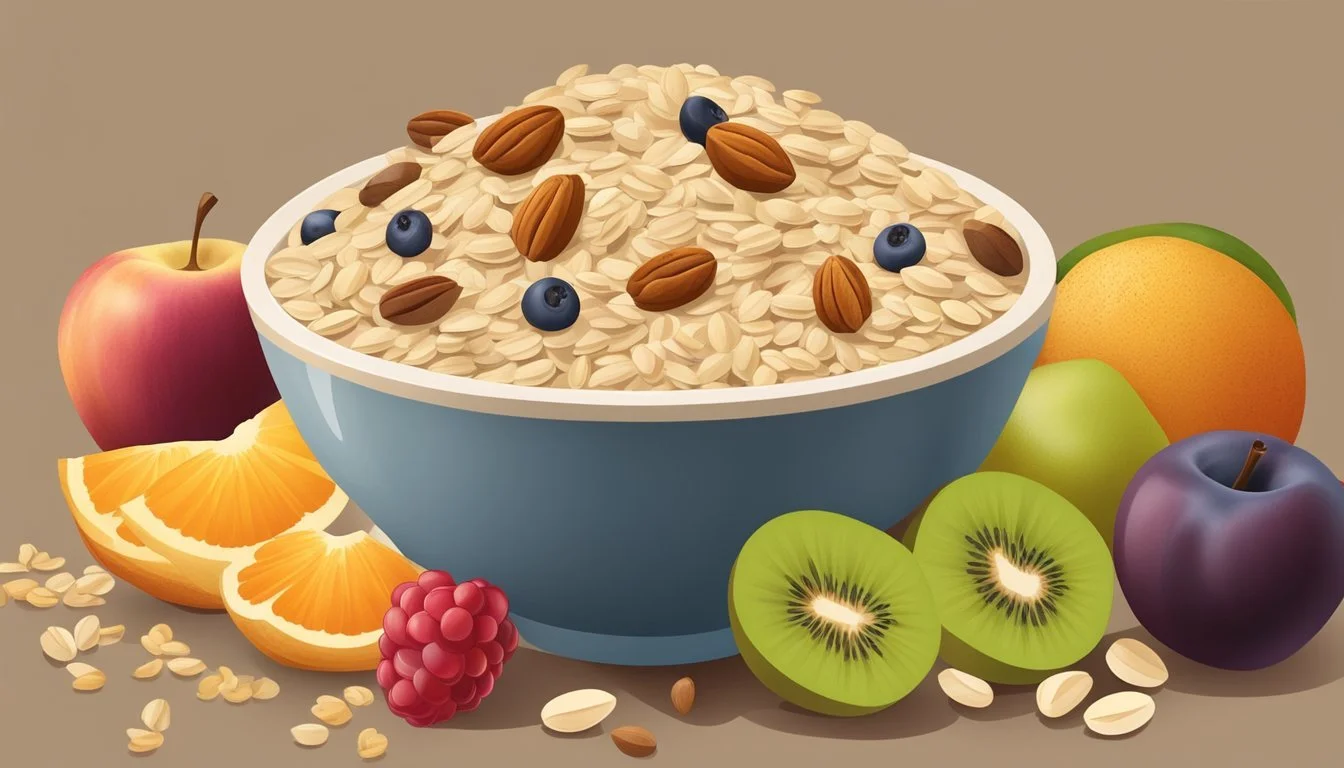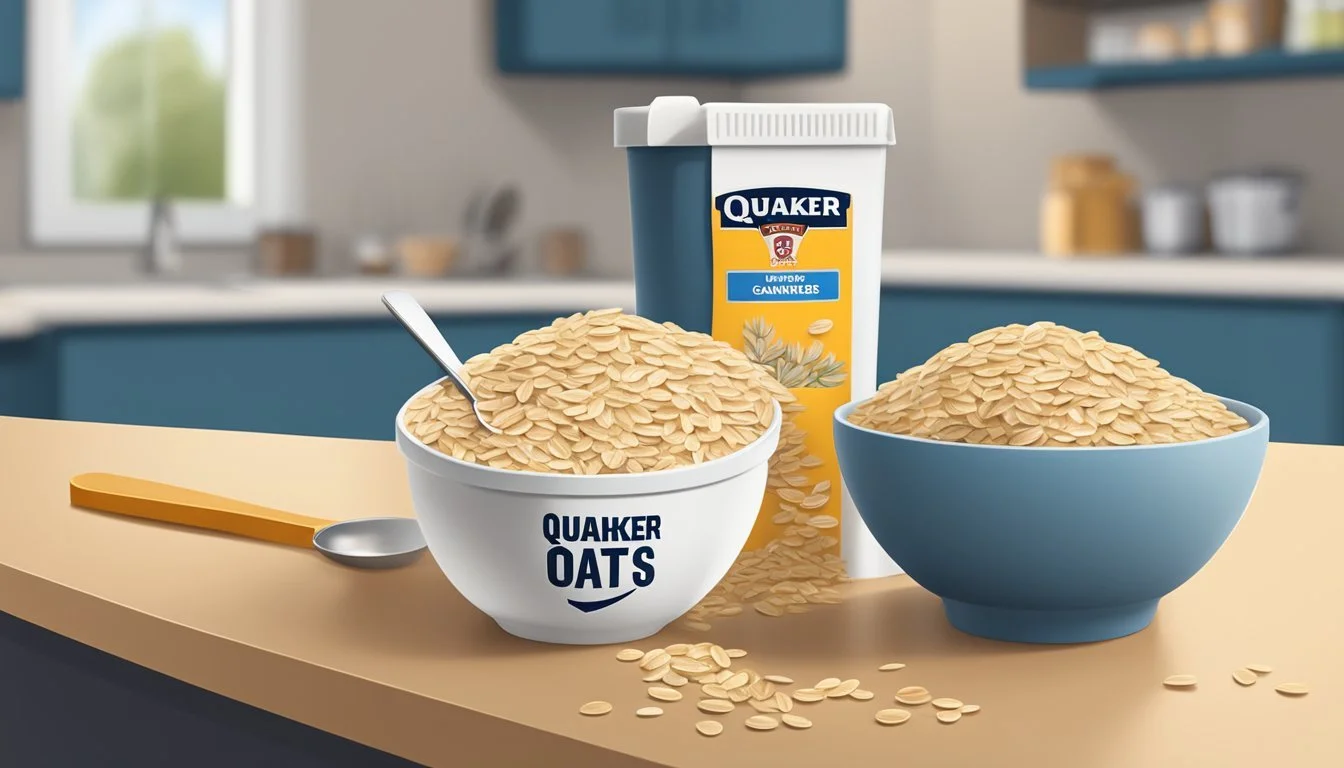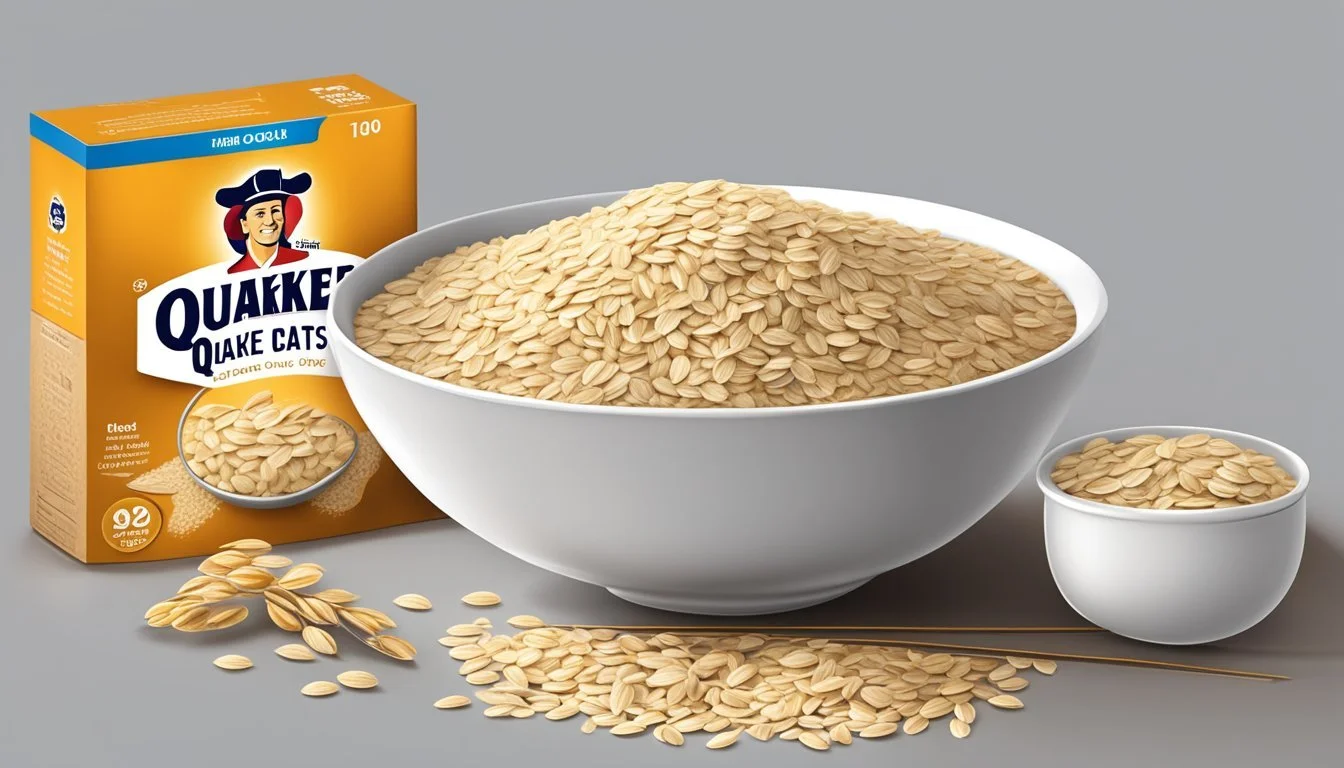How Many Servings of Quaker Oats Per Day Is Too Much?
Understanding Daily Limits
Oatmeal has long been revered as a wholesome breakfast choice, packed with dietary fiber, essential nutrients, and the ability to provide sustained energy throughout the morning. When it comes to brands like Quaker Oats, they offer a convenient and quick solution for a healthy meal that is both versatile and easy to prepare. However, as with all foods, there is a balance to be struck between adequate consumption and overindulgence.
Determining how much oatmeal, specifically Quaker Oats, one should eat per day depends on individual dietary needs and health goals. Typically, a single serving of cooked oatmeal is considered to be one cup, which aligns with dietary recommendations for portion size. While this portion may furnish an individual with the necessary nutrients and satiety, exceeding this amount could potentially lead to an excess of calories and a lack of dietary variety, which is crucial for overall health.
It is essential to consider the overall context of a diet in which Quaker Oats is incorporated. A balanced approach not only pays attention to serving sizes but also to the accompaniments that go with the oatmeal. Nutritious toppings such as fruits, nuts, and seeds can enhance the health benefits of oatmeal, but care should be taken not to amplify the calorie content significantly with excessive sweeteners or high-calorie additives. Hence, the number of servings of Quaker Oats that constitutes as 'too much' will vary, but moderation and a mix of other food groups are key to optimizing well-being.
Nutritional Profile
Quaker Oats offer a wealth of nutrients that contribute to a balanced diet, including essential vitamins and minerals, carbohydrates for energy, dietary fiber for digestion, and a low fat content.
Essential Nutrients and Benefits
Quaker Oats are a good source of essential nutrients. They provide protein, which is vital for building and repairing tissues, and they also contain a variety of minerals such as magnesium, phosphorus, zinc, and copper, which support numerous bodily functions.
Protein: Important for muscle repair and growth
Minerals: Including magnesium (important for nerve function), phosphorus (critical for bone health), zinc (immune system support), and copper (connective tissue formation)
Caloric Content
A 1/2 cup serving of dry Quaker Oats contains approximately 150 calories. The caloric content should be accounted for in the context of a daily diet, ensuring it balances with other food intake to maintain a healthy energy level.
Calories: 150 per 1/2 cup dry serving
Carbohydrates and Fiber
Quaker Oats are rich in carbohydrates, specifically complex carbs, which provide a steady release of energy throughout the day. They are also notably high in both soluble and insoluble dietary fiber which can aid digestion and contribute to heart health.
Carbohydrates: around 27 grams per 1/2 cup dry serving
Dietary Fiber: 4 grams per 1/2 cup, including soluble and insoluble fiber
Fat and Cholesterol
Quaker Oats are low in fat, with 3 grams per 1/2 cup serving, of which a very small amount is saturated fat. They contain no cholesterol, making them a heart-healthy choice of grain.
Total Fat: 3 grams per 1/2 cup serving
Saturated Fat: Minimal
Cholesterol: None
Vitamins and Minerals Fortification
While naturally rich in certain minerals, Quaker Oats may also be fortified with vitamins and minerals, such as Vitamin A and calcium. This fortification can enhance their nutritional value, particularly when it comes to building strong bones and maintaining good vision.
Fortified Nutrients: May include Vitamin A and calcium
Natural Mineral Content: Includes sodium, among others
The nutritional profile of Quaker Oats makes them an adaptable and nourishing addition to a daily diet within appropriate serving sizes.
Health Benefits
Quaker Oats and similar oatmeal products offer a range of health benefits when consumed as part of a balanced diet. These benefits span from supporting heart health to aiding in weight management, alongside fostering better digestive health, regulating blood sugar levels, and enhancing immune system support.
Heart Health
Oats are a heart-healthy grain due to their soluble fiber content, specifically beta-glucan, which can contribute to lower cholesterol levels. Reducing cholesterol is critical in preventing heart disease. Incorporating whole grains like oatmeal into one's diet can also lead to improvements in heart health over time.
Weight Management
The fiber in oatmeal enhances the feeling of fullness, which can prevent overeating and help in weight management. It is an excellent addition to the diet for those looking to control or reduce their weight effectively.
Digestive Health
A diet rich in fiber from whole grains, fruits, and vegetables promotes healthy gut bacteria and regular bowel movements. Regular consumption of oatmeal can help prevent constipation and ensure a well-functioning digestive tract.
Blood Sugar Regulation
Oats can help in the regulation of blood sugar levels, making it beneficial for individuals with diabetes or those looking to maintain a stable blood sugar. The beta-glucan in oats may improve insulin sensitivity, thereby aiding blood sugar control.
Immune System Support
The fiber and nutrients in oats may bolster the immune system. A diet inclusive of fiber-rich foods like oats supports the proliferation of healthy gut bacteria, which are instrumental in maintaining a robust immune system.
Proper Servings and Safety
Eating oatmeal is a nutritious way to start the day, but understanding the proper serving size and recognizing the risks of overconsumption is crucial for maintaining a balanced diet.
Recommended Serving Size
For adults, the USDA recommends a daily intake of about 6 ounces of grains, half of which should be whole grains. A typical serving size for oatmeal is 1/2 cup of dry oats, which is equivalent to approximately 2 grain servings. A dietitian or RDN may adjust these guidelines to accommodate individual dietary needs or health goals. Oatmeal, when eaten in the right portion size, can be part of a heart-healthy diet and may assist in regulating blood sugar.
Overconsumption Risks
Consuming more than the recommended serving size of oatmeal can lead to unintended weight gain and imbalances in daily caloric intake. It's also important to be mindful of toppings like sugar and butter. Excessive sugar can negatively impact blood sugar control, while too much fat may increase the risk of heart disease. A healthcare provider, such as a doctor or RDN, can clarify the effects of high oatmeal consumption based on the individual's health profile.
Special Dietary Considerations
Gluten-Free: Oatmeal is naturally gluten-free, making it suitable for those with celiac disease or gluten intolerance. However, cross-contamination can occur during processing, so it’s advisable for consumers to verify the product is certified gluten-free.
Nut Allergy: Individuals with nut allergies should avoid oatmeal products that may contain nuts or were processed in a facility with nuts.
Low-Fat and Low-Sugar Diets: Opting for oatmeal as a snack or meal can be in line with low-fat and low-sugar diets, as plain oatmeal holds no added sugar and is low in fat. Choice of toppings should be considered to maintain dietary compliance.
Incorporating Oats into Your Diet
Incorporating oats into a daily diet requires understanding the different types available, their preparation methods, and how to create balanced meals. Oats can be a versatile ingredient, ideal for a healthy breakfast or satisfying snack, that provides beneficial carbohydrates and helps maintain satiety.
Different Types of Oats
Steel-cut oats are whole oat groats that have been chopped into pieces and have a chewy texture. Rolled oats, also known as old-fashioned oats, are steamed and flattened, making them quicker to cook. Instant oats are the most processed; they cook the fastest but often have added sugars. For those seeking to maximize nutrition, steel-cut or rolled oats are preferable. Overnight oats offer a no-cook alternative by soaking rolled oats in milk or yogurt overnight, which enhances digestibility and convenience.
Preparation Methods
Oats can be prepared in a variety of ways to cater to individual tastes and schedules. For a quick option, one can simply add boiling water to instant oats and let them sit for a few minutes. Microwaving rolled oats with water or milk takes little time and effort. For a creamier and richer flavor, one can use a slow cooker for steel-cut oats. The fundamental ratio is typically one part oats to two parts liquid.
Oat Type Cooking Method Liquid Ratio Steel-cut Oats Slow cooker 1:4 Rolled Oats Microwave 1:2 Instant Oats Boiling Water 1:1.5
Creating a Balanced Meal
A healthy oatmeal bowl combines carbohydrates from oats with proteins and fats to achieve satiety. Adding a scoop of protein powder, an egg on the side, or a dollop of Greek yogurt can significantly increase the protein content. Accompany this with healthy fats such as nuts or nut butters — think almonds or peanut butter — for a meal that balances macronutrients.
Tasty Oatmeal Enhancements
To keep oatmeal interesting and increase its nutritional profile, get creative with enhancements:
Sweeteners: A moderate amount of brown sugar, maple syrup, or honey offers sweetness.
Fruits: Add fresh or dried fruits for natural sugars and fiber.
Seeds and nuts: Sprinkle chia seeds or chopped nuts for crunch and nutrients.
Spices: A pinch of cinnamon can add warmth and flavor without calories.
By choosing the right type of oats, employing various preparation methods, creating balanced meals, and infusing flavor with healthy enhancements, oats can be a nutritious and delightful addition to one's daily diet.
Serving Size Tips and Measurements
A consistent serving size of Quaker Oats can effectively manage hunger and provide steady energy, but the optimal amount depends on individual dietary needs and goals. Attention to portion control, physical activity levels, and nutritional objectives informs the right quantity for each person.
Understanding Portion Control
Proper portion control is critical for maintaining good health. A standard serving size of dry Quaker Oats is 1/2 cup, which typically expands to about 1 cup when cooked. This provides a substantial amount of fiber, which aids in satiety and supports digestive health, and around 150 calories. Dietitians often recommend whole grains like oatmeal because they're a balanced source of carbs, moderate protein, and low fat.
Adapting Servings for Physical Activity
Individuals with higher levels of physical activity may require larger portions of oats for optimal energy and muscle mass recovery. The amount of physical exercise dictates the need for more calories and protein to aid in muscle repair and metabolism support. Athletes or those engaged in heavy labor might consider upping the portion to 3/4 to 1 cup of dry oats to accommodate their increased caloric expenditure.
Adjusting for Personal Nutrition Goals
Tailoring Quaker Oats servings to personal nutrition goals such as weight loss or managing blood sugar levels is essential. For weight loss diets, it's crucial to balance the serving with overall daily calorie intake, possibly opting for a smaller 1/4 cup dry (about 1/2 cup cooked) oatmeal serving. However, for those focusing on blood sugar control, the fiber in the standard 1/2 cup serving can help moderate glucose levels. It's beneficial to consult with a dietitian for individualized advice on portion and macro-nutrient adjustments.
Conclusion
When incorporating Quaker Oats into a diet, it is essential to consider the balance of dietary fiber and overall nutrition needed for individual health goals. Oatmeal, rich in dietary fiber, particularly beta-glucan, contributes positively to heart health and can aid in blood sugar control.
Daily Recommendations:
Adults should consume about 25 to 38 grams of fiber daily, and a single serving of Quaker Oats typically contains 4 grams.
Consuming 3 grams per day of beta-glucan, approximately one bowl of oatmeal, can offer cardiovascular benefits.
Overserving Considerations: While oats are nutritious, they should be part of a varied diet. Overconsumption can lead to excessive fiber intake, causing digestive discomfort. It's also important to balance oats with other nutrient sources.
Serving Suggestions: To optimize nutrition, individuals can add a variety of toppings and mix-ins to their oatmeal:
Nuts and seeds for healthy fats and proteins
Fresh fruits for vitamins and natural sweetness
Low-fat dairy or plant-based milk to enhance creaminess
Guidelines: They should limit the intake of sugar-laden instant oatmeal varieties and monitor portion sizes to align with personal health requirements. Considering these factors, individuals can integrate Quaker Oats into a balanced diet without exceeding nutritional limits.

